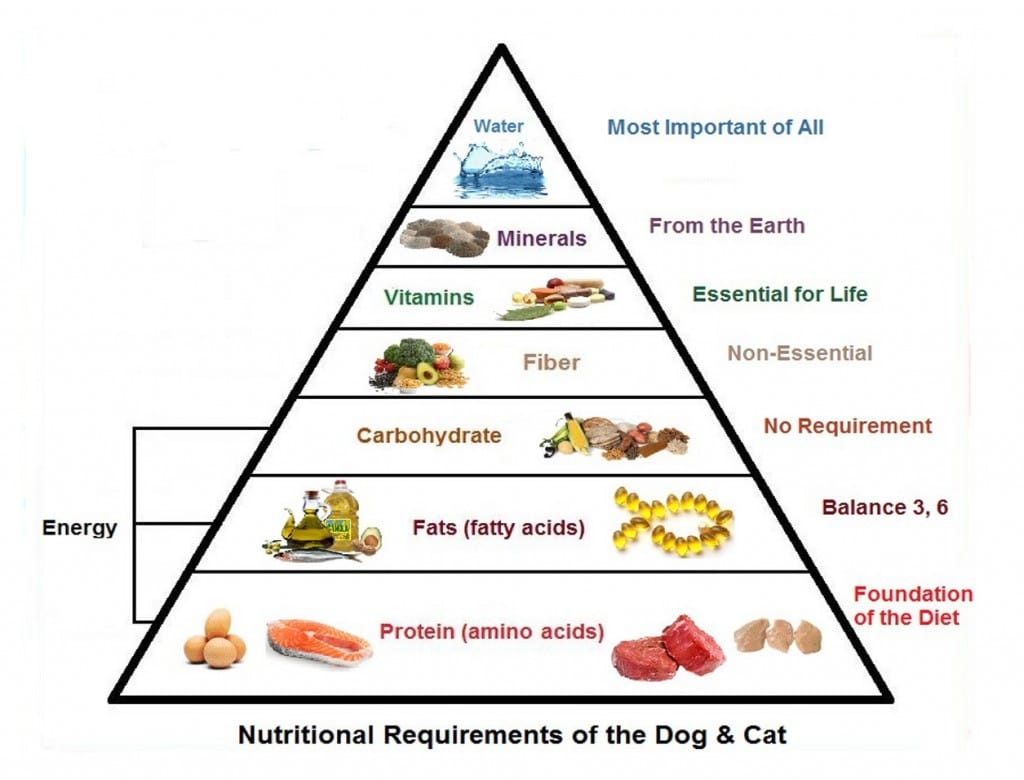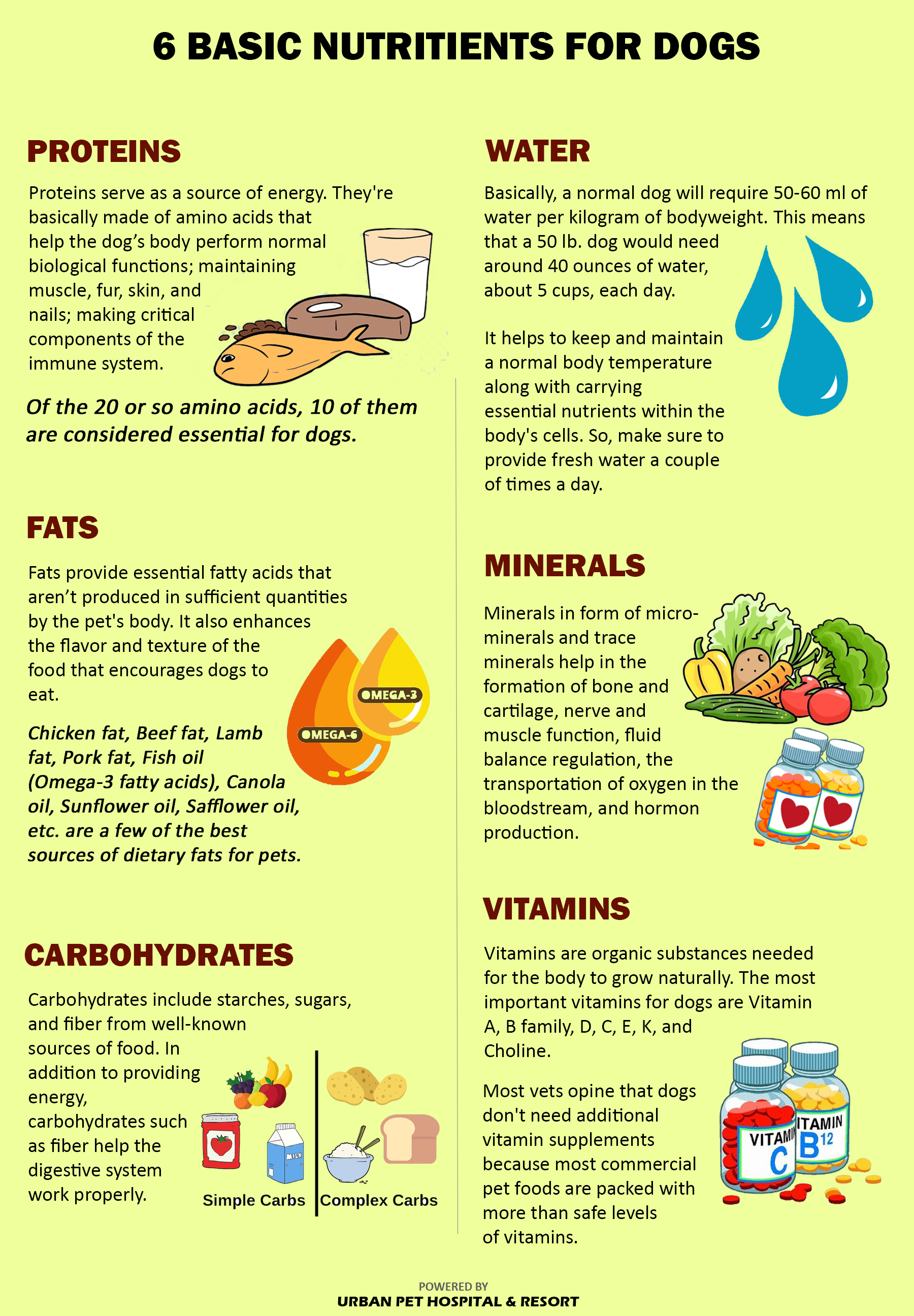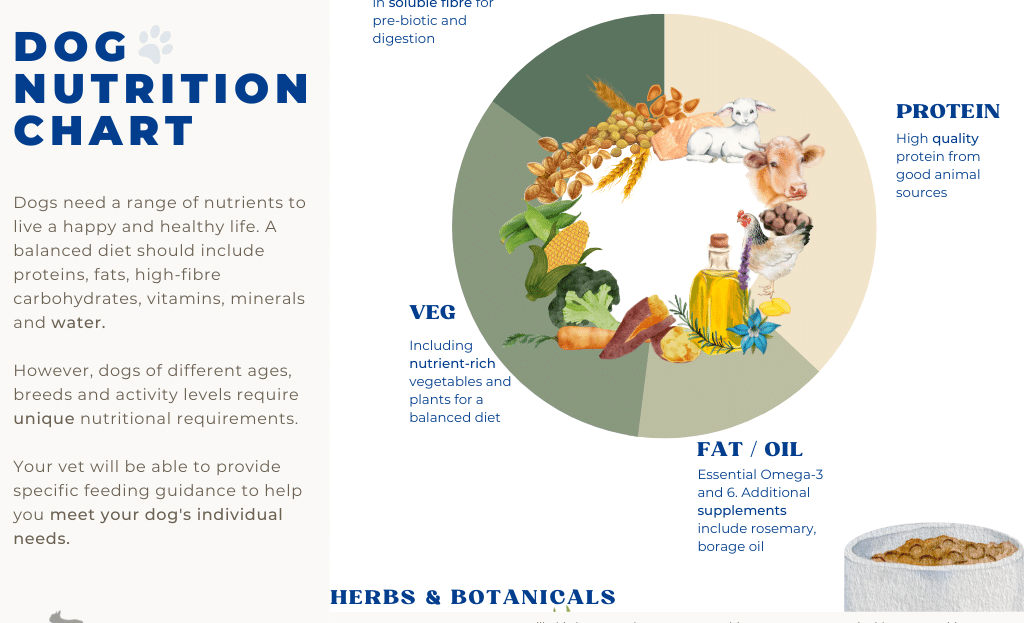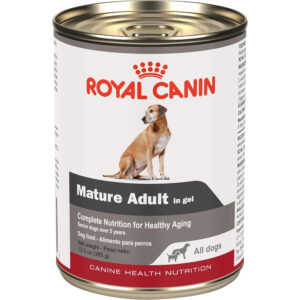Every dog needs proper nutrition to thrive. Just like humans, dogs require a balanced diet to stay healthy.
Understanding a dog's nutritional needs is key for pet owners. Dogs need protein, fats, carbohydrates, vitamins, and minerals. Each nutrient plays an important role in their growth, energy, and overall well-being. A good diet helps maintain a shiny coat, strong muscles, and a healthy immune system.
Choosing the right food can be overwhelming. Many options exist, from dry kibble to wet food and raw diets. Knowing what your dog requires will help you make informed choices. This guide will explore the essential nutritional requirements for dogs, ensuring your furry friend gets the best care possible.

Credit: www.barclondon.com
Table of Contents
ToggleIntroduction To Canine Nutrition
Understanding dog nutrition is essential for pet owners. Dogs need a balanced diet to stay healthy. Proper nutrition helps dogs grow, stay active, and live longer. Each dog has different nutritional needs based on age, size, and health. Let’s explore why a balanced diet is important.
Importance Of Balanced Diet For Dogs
A balanced diet provides the right mix of nutrients. This helps maintain optimal health. Dogs require different nutrients for various body functions. A well-fed dog has more energy and better immunity. Here are some key reasons why a balanced diet is crucial:
- Supports growth and development
- Maintains healthy weight
- Boosts energy levels
- Improves coat and skin health
- Strengthens the immune system
Key Nutrients For Canine Health
Dogs need several essential nutrients. These include:
| Nutrient | Importance |
|---|---|
| Proteins | Builds and repairs body tissues. |
| Fats | Provides energy and supports cell growth. |
| Carbohydrates | Offers energy and aids digestion. |
| Vitamins | Supports various body functions. |
| Minerals | Maintains bone health and overall well-being. |
| Water | Essential for hydration and digestion. |
Each nutrient plays a vital role. They work together to keep dogs healthy. Ensuring dogs get these nutrients is key to their well-being.

Credit: drbillspetnutrition.com
Proteins: Building Blocks For Dogs
Proteins are essential for a dog's health. They serve as the building blocks for muscles, skin, and organs. A diet rich in protein helps dogs grow strong and stay active. Without enough protein, dogs can face serious health issues.
Role Of Proteins In A Dog's Diet
Proteins play many vital roles in a dog's diet:
- Muscle Development: Proteins help build and repair muscle tissue.
- Enzyme Production: They aid in creating enzymes for digestion.
- Hormone Regulation: Proteins help produce hormones that control body functions.
- Immune Function: They support the immune system to fight off illness.
- Energy Source: Proteins can provide energy when carbohydrates are low.
Each dog's protein needs vary. Factors include age, size, and activity level. Puppies need more protein for growth. Active dogs also require higher protein levels to maintain energy.
Best Protein Sources For Dogs
Choosing the right protein source is crucial. Here are some of the best options:
| Protein Source | Benefits |
|---|---|
| Chicken | Lean meat, easy to digest, high in protein. |
| Beef | Rich in iron and essential amino acids. |
| Fish | High in omega-3 fatty acids, supports skin health. |
| Eggs | Complete protein source, packed with vitamins. |
| Legumes | Plant-based protein, good for digestion. |
Consider these tips for feeding protein to your dog:
- Choose high-quality protein sources.
- Balance protein with other nutrients.
- Consult a vet for specific needs.
Feeding your dog the right amount of protein helps them thrive. Monitor their health regularly to ensure they get what they need.
Fats: Essential For Energy And Health
Fats play a crucial role in your dog's diet. They provide energy and support overall health. Dogs need fat for healthy skin, a shiny coat, and proper cell function. Fats also help absorb important vitamins. Understanding the right fats is key for your pet's well-being.
The Function Of Fats In Canine Diets
Fats serve many important functions in a dog's body:
- Energy Source: Fats are a concentrated energy source. They provide more than double the energy compared to proteins and carbohydrates.
- Cell Structure: Fats are essential for building cell membranes. They help maintain cell integrity.
- Vitamin Absorption: Fats help absorb fat-soluble vitamins A, D, E, and K.
- Skin and Coat Health: Fats contribute to a healthy skin and coat. They prevent dryness and irritation.
- Hormone Production: Fats are vital for producing hormones. Hormones regulate various body functions.
Healthy Fat Sources For Your Pet
Choosing the right fats is essential. Here are some healthy fat sources for your dog:
| Fat Source | Benefits |
|---|---|
| Fish Oil | Rich in omega-3 fatty acids. Supports heart health. |
| Flaxseed Oil | High in omega-3. Good for skin health. |
| Chicken Fat | Tasty source of energy. Rich in essential fatty acids. |
| Olive Oil | Contains monounsaturated fats. Promotes heart health. |
| Coconut Oil | Provides quick energy. Supports immune system. |
Always consult your vet before changing your dog's diet. They can guide you on the right fat sources and amounts for your pet. Balancing fats with other nutrients is key for your dog's overall health.
Carbohydrates: Fuel For Active Dogs
Carbohydrates play a key role in your dog's diet. They provide energy for daily activities. Active dogs need this energy for play, exercise, and exploration. Choosing the right carbs helps keep your dog healthy and energetic.
Benefits Of Carbs In A Dog's Diet
Carbohydrates offer several benefits to dogs. Here are some key points:
- Energy Source: Carbs are a primary energy source for dogs.
- Digestive Health: Fiber from carbs aids digestion.
- Weight Management: Helps maintain a healthy weight.
- Brain Function: Supports cognitive function and mood.
Including carbohydrates in your dog's diet can improve their overall well-being. They help keep your dog active and playful.
Selecting The Right Carbohydrates
Not all carbohydrates are created equal. Choose high-quality sources for your dog. Here are some options:
| Type of Carbohydrate | Benefits |
|---|---|
| Whole Grains | Provide energy and fiber |
| Fruits | Rich in vitamins and antioxidants |
| Vegetables | Low in calories; high in fiber |
| Legumes | Excellent protein and fiber source |
When selecting carbs, avoid processed grains and sugars. They can cause health issues. Always choose natural, whole-food options.
Consult your vet for personalized advice. They can help you find the best carbohydrate sources for your dog's needs.
Vitamins And Minerals: Micro-nutrients Matter
Vitamins and minerals are essential for your dog's health. These micro-nutrients support many bodily functions. They help keep your dog active and healthy. Without them, your dog may face health issues.
Providing the right balance of vitamins and minerals is key. Dogs need these nutrients for strong bones, a shiny coat, and overall wellness. Let’s explore the essential vitamins and important minerals your dog needs.
Essential Vitamins For Dogs
Vitamins play a vital role in your dog's diet. Here are some important vitamins:
- Vitamin A: Supports vision, skin health, and immunity.
- Vitamin D: Helps with calcium absorption for strong bones.
- Vitamin E: Acts as an antioxidant and protects cells.
- Vitamin K: Important for blood clotting and bone health.
- B Vitamins: Aid in energy production and brain function.
These vitamins can come from various foods. Fresh fruits, vegetables, and meats can provide these nutrients.
Important Minerals For Canine Health
Minerals are just as crucial for your dog. Here are key minerals to consider:
- Calcium: Essential for strong bones and teeth.
- Phosphorus: Works with calcium for healthy bones.
- Potassium: Supports muscle function and heart health.
- Iron: Necessary for blood production and energy.
- Zinc: Important for skin health and immune function.
These minerals help maintain your dog's overall health. A balanced diet should include them for optimal well-being.
Water: The Overlooked Nutrient
Water is vital for dogs. It often gets less attention than food. Many owners focus on protein and vitamins. However, water is just as important for your pet's health. Without it, dogs can face serious health issues. Understanding hydration is key to keeping your dog happy and healthy.
Hydration And Its Impact On Health
Hydration affects every part of a dog's body. It helps with digestion, circulation, and temperature regulation. Without enough water, a dog can become dehydrated quickly. Dehydration can lead to kidney problems and other health issues.
Signs of dehydration include dry gums, lethargy, and loss of skin elasticity. Always monitor your dog's water intake. Proper hydration supports a healthy coat and skin. It also boosts energy levels.
Ensuring Adequate Water Intake
Make sure your dog has access to fresh water at all times. Change the water daily to keep it clean. Some dogs may not drink enough on their own. Encourage drinking by adding water to their food.
Try using a pet fountain. Many dogs prefer running water. It can entice them to drink more. Monitor their water consumption, especially in hot weather or after exercise.
Consult your vet for specific water needs. Factors like size, age, and activity level matter. Proper hydration is crucial for your dog's overall well-being.
Special Dietary Considerations
Every dog is unique. Their dietary needs can change due to various factors. Understanding these special considerations is vital for their health.
Adjusting For Life Stages And Activity Levels
Dogs go through different life stages. Puppies, adults, and seniors all have unique needs. Puppies require more protein and calories for growth. Adult dogs need balanced nutrition to maintain health. Senior dogs often need fewer calories but more fiber.
Activity levels also matter. Active dogs need more energy. They benefit from higher protein and fat content. Less active dogs should have fewer calories. This helps prevent obesity and related health problems.
Managing Dietary Needs For Health Conditions
Some dogs have health issues. These conditions may require special diets. For example, dogs with allergies need hypoallergenic food. This helps reduce reactions to certain ingredients.
Dogs with kidney disease may need lower protein diets. This helps ease strain on their kidneys. Weight management diets are important for overweight dogs. These diets can help them lose weight safely.
Always consult a vet for specific dietary needs. They can provide tailored advice for your dog's health.

Credit: www.urbanpethospital.com
Reading Dog Food Labels
Understanding dog food labels is vital for your pet's health. Labels provide key information about the food's ingredients and nutritional value. This helps you choose the best food for your dog.
Interpreting Nutritional Information
Nutritional information on dog food labels can be confusing. Here are some key elements to look for:
| Label Element | Description |
|---|---|
| Guaranteed Analysis | Lists minimum and maximum nutrient levels. |
| Ingredients List | Shows what the food contains, in order of quantity. |
| Feeding Guidelines | Suggests how much to feed based on your dog's weight. |
Look for high-quality protein sources. Ingredients like chicken, beef, or lamb should be at the top. Avoid foods with fillers like corn or soy.
Choosing The Right Food For Your Dog
Selecting the right food is essential for your dog's health. Consider these factors:
- Age: Puppies need different nutrients than adults.
- Breed: Some breeds have specific dietary needs.
- Health Conditions: Consult your vet for special diets.
Check the label for AAFCO approval. This means the food meets basic nutritional standards. Compare different brands and types to find the best fit.
- Read the ingredient list.
- Check the guaranteed analysis.
- Look for AAFCO approval.
- Consider your dog's specific needs.
Choosing wisely helps your dog live a healthy life.
Homemade Diets And Supplements
Many dog owners consider homemade diets and supplements. This approach can offer more control over your dog's nutrition. It allows you to choose fresh ingredients. But creating a balanced diet is key. Supplements can fill gaps in nutrition. This section explores both homemade diets and the use of supplements.
Creating A Balanced Homemade Diet
To make a balanced homemade diet, focus on key nutrients. Dogs need protein, fats, carbohydrates, vitamins, and minerals. Here’s a simple guide:
| Nutrient | Sources |
|---|---|
| Protein | Chicken, beef, fish, eggs |
| Fats | Fish oil, flaxseed oil, chicken fat |
| Carbohydrates | Brown rice, sweet potatoes, oats |
| Vitamins | Fruits and vegetables like carrots and blueberries |
| Minerals | Calcium from bones, supplements |
Use a mix of these foods. Aim for variety. Avoid harmful foods like chocolate, grapes, and onions. Consult a vet for specific needs.
When To Consider Supplements
Supplements can be helpful in some cases. Here are a few reasons to consider them:
- Your dog has specific health issues.
- Homemade diet lacks certain nutrients.
- Your dog is a puppy, pregnant, or senior.
Common supplements include:
- Omega-3 Fatty Acids: Supports skin and coat health.
- Probiotics: Aids digestion and gut health.
- Multivitamins: Covers general nutrient gaps.
Always consult with a vet before adding supplements. They can recommend the right type and dosage.
Professional Insights And Consultation
Understanding your dog's nutritional needs is essential. Expert advice can help ensure your dog gets the right balance of nutrients. Consulting a professional can guide you in making informed decisions about your dog's diet.
When To Consult A Veterinary Nutritionist
Consider consulting a veterinary nutritionist in these situations:
- Your dog has health issues.
- Your dog has special dietary needs.
- Changing your dog’s food type.
- Weight management concerns.
- Allergies or sensitivities.
These experts can create a tailored meal plan. They consider your dog's age, breed, and health history. Regular check-ups help track your dog’s progress and adjust the diet as needed.
The Role Of Diet In Preventative Health Care
A balanced diet plays a vital role in your dog's health. Proper nutrition can prevent many health issues. Here are some benefits of a good diet:
| Benefit | Description |
|---|---|
| Weight Management | Helps maintain a healthy weight. |
| Stronger Immune System | Supports overall health and disease resistance. |
| Healthy Skin and Coat | Provides essential fatty acids and vitamins. |
| Improved Digestion | Good fiber content aids digestive health. |
Regular consultations with a veterinary nutritionist can optimize your dog's diet. This proactive approach can enhance your dog's quality of life.
Frequently Asked Questions
What Do Dogs Need For A Balanced Diet?
Dogs require a mix of proteins, carbohydrates, fats, vitamins, and minerals for a balanced diet. High-quality proteins support muscle health, while fats provide energy. Carbohydrates are essential for digestion. Additionally, vitamins and minerals ensure proper bodily functions. Always consult with a veterinarian for specific dietary needs.
How Much Protein Should A Dog Eat Daily?
A dog's protein intake depends on its size, age, and activity level. Generally, adult dogs need about 18-25% of their diet from protein. Puppies and active dogs may require higher protein levels, around 22-32%. Consult your vet to determine the ideal protein percentage for your dog's specific needs.
Can Dogs Be Vegetarian Or Vegan?
Yes, dogs can thrive on vegetarian or vegan diets if they are well-planned. It’s crucial to ensure all nutritional needs are met, especially proteins and essential fatty acids. Many commercial vegetarian dog foods contain adequate nutrients. Always consult a veterinarian before switching to a vegetarian or vegan diet.
What Vitamins Are Essential For Dogs?
Dogs require several essential vitamins, including A, D, E, and B-complex vitamins. Vitamin A supports vision and immune function, while vitamin D aids in calcium absorption. Vitamin E acts as an antioxidant, and B vitamins help with energy metabolism. A balanced diet typically provides these vitamins, but supplements may be necessary.
Conclusion
Understanding your dog's nutritional needs is vital for their health. A balanced diet keeps them active and happy. Focus on high-quality proteins, fats, and essential vitamins. Always consult your vet for specific needs. Every dog is unique, and their diet should reflect that.
Pay attention to their age, size, and activity level. Good nutrition leads to a longer, healthier life for your furry friend. Make informed choices. Your dog will thank you with love and loyalty. Prioritize their nutrition for a happy, fulfilling life together.














